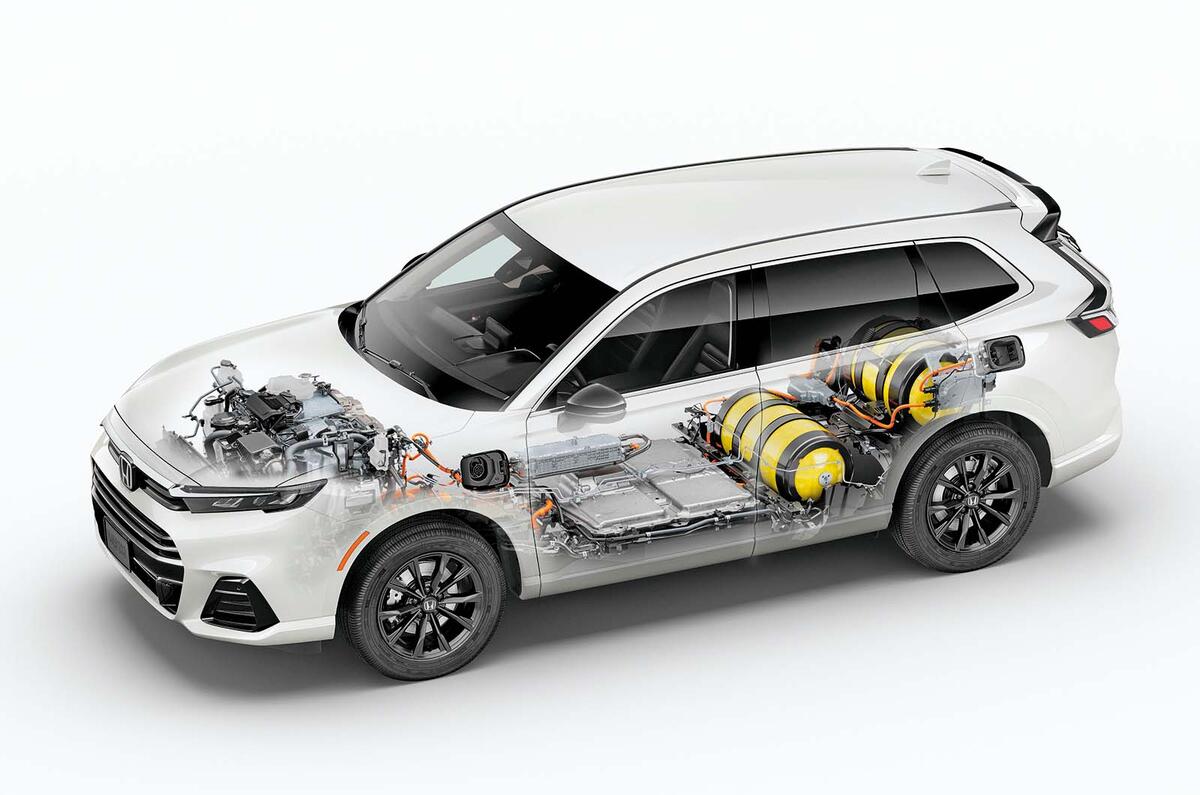Just over half a century since the automotive world got properly revved up by the prospect of hydrogen fuel cell cars (FCEVs), they still haven’t happened.
They failed to take over the world in the same way that BEVs appear to be doing. But the same key FCEV players from back in the day are still quietly getting on with it.
General Motors and Honda are two of those and both have a track record, Honda since the early 1990s and GM since the Electrovan FCEV in 1966.
In February, Honda unveiled the production version of its CR-V e:FCEV plug-in, which goes on lease sale to customers in Japan and the US later this year. The FCEV is powered by a fuel cell system made by a GM and Honda joint venture called Fuel Cell System Manufacturing (FCSM), based in Michigan.
With a range of 372 miles on a full tank of hydrogen plus a further 37 miles of battery range (according to the WLTP test cycle) and a refuelling time akin to that of a petrol or diesel car, the CR-V e:FCEV is built in Ohio at Honda’s Performance Manufacturing Centre.
FCSM started mass production of fuel cell systems in January and what is possibly more significant than the launch of the new car is Honda’s claim that this is the first time hydrogen fuel cell systems have been produced “at scale”.
Fuel cells consume hydrogen and oxygen from the air, producing only electricity, water and heat as by-products with no CO2 or toxic emissions. What they have in common with batteries is that a hydrogen fuel cell is actually a ‘stack’ of small fuel cells combined to make the electrical power required in the same way an EV battery is composed of many small cells, but that’s where the similarity ends.
The GM-Honda system produces around 92kW of electrical energy and the drive motor-generator 174bhp and 229lb ft of torque. The battery has a capacity of 17.7kWh and the hydrogen fuel is gaseous and stored in tanks at 10,000psi.
But the biggest news is perhaps how the decades of R&D into making fuel cell systems may be paying off at last. The cost of the system has been reduced by two-thirds compared with the 2019 Honda Clarity FCEV, partly through a reduction in platinum used as a catalyst in the cells, as well as through the benefits of large-scale production.
Durability of the system is also said to have doubled along with resilience to low-temperature operation, which has always been a challenge with fuel cell systems, partly because of the amount of water they produce internally. Size and weight have been reduced, too, and vibration and noise further improved over that of the Clarity.
The elephant in the room with FCEVs is still the availability (or lack of) a hydrogen network, and as a practical proposition in the UK, FCEVs are still a non-starter. In the US, there were 59 stations at the end of 2023, but that is expected to grow to 4300 by 2030, according to Statista.




Join the debate
Add your comment
A hydrogen fuel cell is an energy wasting machine placed between a renewable energy source and an electric motor.
A battery electric vehicle travels 3 times further on the same energy as a hydrogen fuel cell vehicle does. (And 4-5 times further than a combustion car.) Plus turning electricity into green hydrogen and then back into electricity in a fuel cell, involves significant energy losses. Fuel Cell cars can't compete with battery electric cars in terms of efficiency. Hydrogen for cars is just being pushed by the fossil fuel industry because they are scared of losing market share to EVs. And therefore we can't trust fossil fuel companies. Plus, you can't charge your hydrogen car for free from your solar panels.
And yes, progress in FCEVs has happened - their problem is how battery technology has progressed vastly faster with plummeting prices. Progressed in all respects - energy density, lifespan, charging speed, you name it. And the real problem for hydrogen cars now is that future progress in battery looks set to carry on outpacing that for hydrogen. Too many of the issues for the latter are up against physical constraints, especially to do with hydrogen storage.